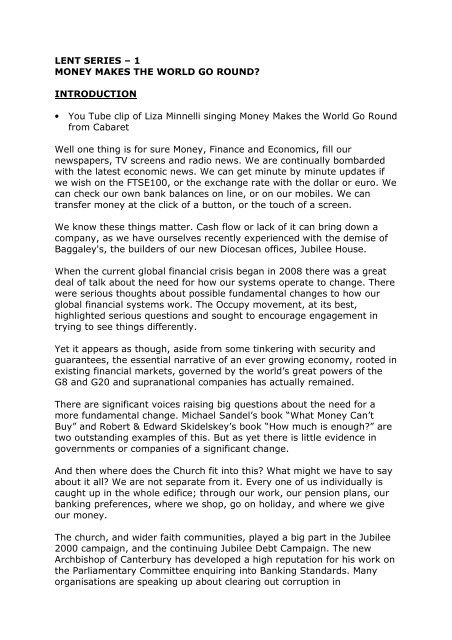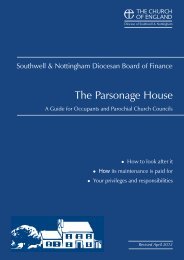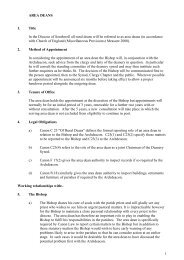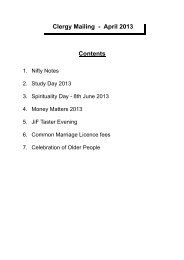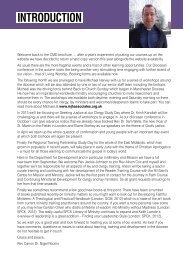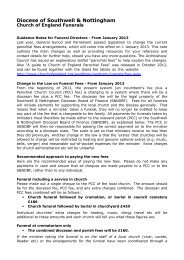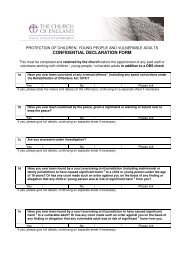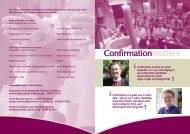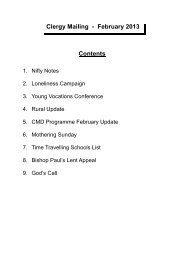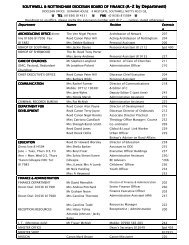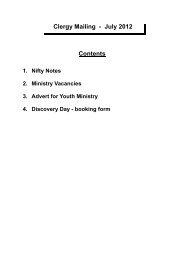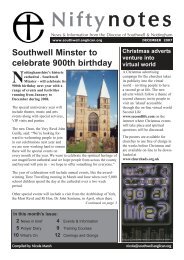LENT SERIES – 1 MONEY MAKES THE WORLD GO ROUND ...
LENT SERIES – 1 MONEY MAKES THE WORLD GO ROUND ...
LENT SERIES – 1 MONEY MAKES THE WORLD GO ROUND ...
- No tags were found...
Create successful ePaper yourself
Turn your PDF publications into a flip-book with our unique Google optimized e-Paper software.
goddess Athena Nikephoros, and the Greek letters that tell us this is the coin of KingLysimachus. He is using the coin, and its images, to assert his authority. Thispractice continues <strong>–</strong> in China images of Mao Tse-Tung; in the United States theimage of George Washington; in our own land the image of Britannia. Moneybecame, quickly, not simply a means of trade but a way of displaying and exertingpower.This power of money could be used for religious purposes as the Gold Coins of Abdal-Malik minted in Damascus in 696-697 AD reveal. Abd al-malik “was the mostimportant Muslim leader since Muhammad himself, because he transformed whatmight have been merely a string of ephemeral conquests into a state that wouldsurvive in one form or another until the end of the First World War” (Macgregorp253). He minted the first overtly Islamic coinage and has his image stamped on it.But within a few years these coins disappeared and were replaced by one thatsimply had text on both sides. Text drawn from the Quran. It thus shows that in thissociety “the dominant power... is now not the emperor but the word of God.”(MacGregor p254).In US currency this could be seen to be echoed in the use of the phrase “In God wetrust” on all their currency.Coins first appeared in China around the same time as Croesus gold coins in Lydiabut China is the originator of paper money. It first appeared with the Ming emperor.Around 1400 AD “Someone in China printed a value on a piece of paper and askedeveryone else to agree with them that the paper was actually worth what it said itwas. You could say that the paper notes, like the Darling children in Peter Pan, weresupposed to be ‘as good as gold’, or in this case as good as copper <strong>–</strong> literally worththe number of copper coins printed on the note. The whole modern banking systemof paper and credit is built on this one simple act of faith. (MacGregor p396). Thewhole phrase on our money “I promise to pay the bearer on demand” is rooted in thispaper representing real metal held elsewhere.In the late sixteenth century the Spanish empire produced “pieces of eight” whichbecame the first truly global currency. They were used across the whole Spanishempire and between Spain and the other nations. Spain was enormously wealthy.The growth of this world currency caused problems in Ming China, creating financialchaos there. In Spain itself inflation happened and a gap developed; “the wealth ofthe empire in both political and economic terms often seemed more apparent thanreal...” one writer in 1600 describes it like this “The cause of the ruin of Spain is thatriches ride on the wind, and have always so ridden in the form of contract deeds, ofbills of exchange, of silver and gold instead of goods that bear fruit and which,because of their greater worth, attract to themselves riches from foreign parts, andso our inhabitants are ruined. We therefore see that the reason for the lack of goldand silver money in Spain is that there is too much of it and Spain is poor becauseshe is rich.” (MacGregor p443)MacGregor’s 99 th object in his history is the Credit Card. He deliberately choosesone issued by a Hong Kong bank in the United Arab Emirates. He notes “Bank creditis, for the first time in history, no longer the prerogative of the elite, and <strong>–</strong> maybe as a
esult, long-dormant religious and ethical issues about the use and abuse of moneyhave been reborn in the face of this ultimate symbol of economic freedom formillions, as some would see it, or, for others, of triumphant Anglo-Americanconsumer culture.” (MacGregor p547).But for the credit card to work in the global, transnational way that it does, alongsidethe phenomenal technology required, one factor remains unchanged, the place oftrust. Mervyn King puts it this way, “As in all types of money or cards used to financetransactions, the acceptability, the trust which the other side of the transaction putsin it, is paramount.” (MacGregor p548). Trust is essential for money, and finance, towork reliably and effectively. So we are back to where we began and the currentfinancial crisis. For fundamentally what has broken down in the whole system isTrust. Banks no longer trust each other. We wonder if we can trust the banks and thebankers. If trust goes the whole system potentially collapses.[Pause for Questions]TURNING TO <strong>THE</strong> BIBLENow I want to turn to the Bible, and in broad sweeping terms look at the key themesthat emerge in biblical teaching. We begin in the gospels with Jesus himself.Jesus and MoneyJesus had a great deal to say about money in his teaching. Just to illustrate here is alist of the parables that involve money in one way or another; the incidents involvingmoney and the teaching about it.ParablesThe two Debtors Luke 7 : 41-43Sower and Seeds Mark 4 : 1-20 (NB v 13-19)Matthew 13 : 1-13Luke 8 : 4-8Hidden Treasure Matthew 13 : 44Pearl of Great PriceMatthew 13 : 45fUnforgiving Servant Matthew 18 : 23-35Good Samaritan Luke 10 : 29-37Persistent Widow Luke 18 : 1-8Rich Fool Luke 12 : 16-21Great Banquet Luke 14 : 12-24Unjust Steward Luke 16 : 1-13
Rich Man and Lazarus Luke 16 : 19-31Labourers in Vineyard Matthew 20 : 1-16Talents Luke 19 : 11-27Matthew 25 : 14-30Wicked Tenants Mark 12 : 1-12Matthew 21 : 33-46Luke 20 : 9-18Sheep and Goats Matthew 25 : 31-46Life IncidentsOffering of two doves by Mary and Joseph <strong>–</strong> Luke 2 : 24Working as a carpenter <strong>–</strong> Matthew 13 : 55fNowhere to lay his head <strong>–</strong> Matthew 8 : 20Provided for by women <strong>–</strong> Luke 8 : 1-3Anointing <strong>–</strong> Luke 7 : 36ff & John 12 : 1ffAccepting hospitality <strong>–</strong> Luke 7 : 36ff; 10:3ff; John 12:1ffGiving hospitality <strong>–</strong> John 6 : 1-15Common Purse <strong>–</strong> John 12 : 6Sending Out 12 & 72 <strong>–</strong> Matthew 10:5ff <strong>–</strong> Luke 10:1ffTeachingTemptations Matthew 4: 1-11 Luke 4 : 1-13Sermon on Mount/Plain Matthew 5 : 7 Luke 6 : 20-49Nazareth Manifesto Luke 4 : 16-21Response to John the Baptist Matthew 11:5 Luke 7:22Disputes Mark 7 : 19-13,27Luke 10 : 38-42Giving Alms and Tithes Luke 11 : 41-42 Matthew 23:23What does it Profit? Mark 8 : 36Counting the Cost Luke 14 : 28-33Temple Tax Matthew 17 : 24-27Rich Young Ruler Mark 10 : 17-31
Zachaeus Luke 19 : 1-10Mary’s Anointing Mark 14 : 3-9 John 12 : 1-8Matthew 26 : 6-13Anointing Luke 7 : 36-50Cleansing the Temple Mark 11 : 15-17 Matthew 21 : 12-16Luke 19 : 45-47 John 2 : 13-17Giving to Caesar Mark 12 : 13-17 Matthew 22 : 15-22Luke 20 <strong>–</strong> 20-38Widow’s Mite Mark 12 : 41-44 Luke 21 : 1-4Prayer Luke 11 : 5-8At the very least these lists show the reality and pervasiveness of moneyin Jesus own day and culture; and how powerfully he believed using itillustratively and speaking about it mattered in his communication of theKingdom of God. It also illustrates why this short series can only offersome reflections on Christian thinking and not be entirely comprehensive.You may want to reflect more deeply on Jesus’ teaching during Lent.Old Testament SettingJesus teaching is entirely set in the framework around possessions andmoney given in the Old Testament through the Torah, the writings andthe prophets. So let us take a brief look at these.The Lawa) The foundation of this is that God is the creator (and thus sustainer) ofall things. “The earth is the Lord’s, and everything in it” (Psalm 24:1).All the creatures are God’s possessions. The land too belongs to God(Lev 25:23, Ps 85:1 Hos 9:3). The whole then is God’s gift. He did notneed to create, but he did. Everything about existence is God given.b) Since all is God’s, and is for him, then humankind is given the task ofbeing the responsible steward of creation, not the possessor of it (Gen1+2, Psalm 104). We are receivers of the gift and our response is to“give back to the Giver, who keeps giving to us”.c) In exercising good stewardship the Law recognises that land, and thusthe produce of the land will change hands. Some will grow richer, andothers poorer. Hence a whole range of laws are given that seek toensure that the poor are both protected and provided for. The lawseeks to stop the rich exploiting the poor (cf Exodus 21:1-11 and
Exodus 21-23 in full). The most powerful of these laws is that ofJubilee (Leviticus 25) which sought to ensure that in each generationthe balance of ownership, and thus control, was restored to a balancedequity. The continuous enrichment of the successful andimpoverishment of the poor was not to mark the people of Israel. Theprovision for the poor also was never to diminish their own value andintegrity; nor was it to make them lazy <strong>–</strong> so they had to collect thegrain left in the fields themselves. They were to work to provide forthemselves; but the whole society was to ensure there was work forthem to do. This is wonderfully illustrated in practice in the story ofRuth.d) The law recognised that from Adam and Eve onwards humankind hasbeen subject to the desire to have that which it should not have, or tohave more than its fair share <strong>–</strong> hence the 8 th commandment “You shallnot steal” and the 10 th commandment, “You shall not covet” (Exodus20:15+17 Deut 5:19+21)e) It also recognised the danger of wealth leading to a sense of selfsufficiency and ability leading to a failure to recognise or rely on God.Wealth and success tended to pull people away from God rather thantowards him (Deut 8 esp 11-14,17f) Wealth and possessions wereseen as a sign of God’s blessing but there was also this recognition oftheir danger and curse.f) It also set the law not only in the context of God as Creator but also asRedeemer. The law reminds the Israelites that they were rescuedslaves and so they were to treat all well, as God had treated them(Deut 6,9,11; Lev 19:1-18)The WritingsWhen it comes to the Writings, like the Psalms, Proverbs and Ecclesiastesthere is a real awareness that wealth is not always gained through goodbehaviour and as a blessing. The dangers of wealth are well recognised,as is the impermanence of it (e.g. Psalm 73, Ecclesiastes, Proverbs10+11). There is recognition that hard work can produce wealth, and thatlaziness or folly can lead to poverty. Yet equally a recognition that not allwealth is gained fairly or honestly, and that poverty is not a sign offailure. Hence the balance arrived at by Agur “Give me neither povertynor riches” (Prov 30:8).The ProphetsThe books we tend to call ‘History’ give due warning about the growingpower and wealth of the monarchy. Samuel warns the people of thedemand for taxes, and service, that a King will make on them (1 Sam8:11-18). The growth in wealth and power of the King is then
demonstrated through the reigns of Saul, David and Solomon and thenremains a running theme through the rest of the history.The prophets root their preaching in God as Creator and Redeemer. Theycall God’s people back both to the truth that God is the Maker andSustainer of all things; and to their history of being rescued, saved,delivered by the God who makes and keeps his covenants with his people(eg Is 40-66; Jeremiah 10,18,23)The prophets themselves keep calling the wealthy and powerful toaccount for their misuse and abuse of their wealth and power. They cryout for justice for the poor <strong>–</strong> for fairness in the courts, for provision forthe hungry and needy, for mercy and generosity. This runs through themall <strong>–</strong> from Elijah’s words against Ahab, through the first written prophetsHosea and Amos (Hosea 6-7 Amos 4-6) on through the great writings ofIsaiah, Jeremiah and Ezekiel, to the final written prophesies of Malachiand Daniel. God’s word keeps calling his people back to relying on him,not their own power or wealth. It keeps calling them to be a peoplemarked out by justice. In the visions of the Messianic age the vision of apeople living in harmony with God, with each other and with creation iscontinually held out (e.g. Isaiah 11, 58, 61, 65 Zechariah 8, Ezekiel 40-48Micah 4)JesusIt is this whole background, along with the prophetic words of John theBaptist that lie behind Jesus own teaching.Jesus refers to Mammon, a Semitic word for money or possessions twicein his teaching. The best known is that found in the Sermon on the Mount,“No one can serve two masters, for either he will hate the one and lovethe other, or he will be devoted to the one and despise the other. Youcannot serve God and money.” (Matt 6:24). The second comes in Luke’sgospel and is connected with the Parable of the Dishonest Manager. Thisteaching ends with the same words as those in the Sermon on the Mountbut immediately after the parable Jesus says to the disciples, “And I tellyou, make friends for yourselves by means of unrighteous mammon, sothat when it fails they may receive you into the eternal dwellings and onewho is faithful in a very little is also faithful in much, and one who isdishonest in a very little is also dishonest in much. If then you have notbeen faithful in the unrighteous mammon, who will entrust to you the trueriches?” (Luke 16:9-11)In most of the use of money in Jesus’ teaching he appears to warn of itsdangers but does not make money in and of itself either positive ornegative. Money itself appears to e morally neutral. Yet here Jesusdescribes it directly as “unrighteous”. Most of the commentators suggestthat Jesus’ description here is to see money as “of this world” and isrecognising, as he does elsewhere, how often money is gained through
injustice, or stored up and used selfishly, thus unrighteously, rather thanmoney and possessions being sinful and unclean in themselves. They areprobably correct. But the language reminds us again just how dangerousmoney can be.Jesus thrust in his teaching is that so easily we slide into trusting in andrelying on money and possessions rather than on God. We becomeservants of money. We do what it tells us, we place our allegiance in themarkets, in our savings, in our goods, rather than in the God who is thecreator and sustainer of all things. We stop believing, if we had everbegun to, that God loves us and will care for us. We think we have to doit all for ourselves. This is why the story of the Rich Young Ruler hurts us<strong>–</strong> he was a highly moral, upright, law abiding, family loving young man,but he could not let go of his possessions and put God first.It is why the parable of the Rich Fool bites. The behaviour of the man isour natural instinct; build up our wealth as insurance against a bad day.Trust in our possessions rather than put God first in all things.Richard Foster in his book “Money, Sex and Power” very helpfullysummarises Jesus teaching on money as showing us both the Dark andthe Light side of money.The Dark SideThe dark side of money is the way in which it constantly threatens ourrelationship with God. Jesus warns us of the dangers time and again.“Woe to you that are rich” (Luke 6:24) “Do not lay up for yourselvestreasures in earth” (Matt 6:`9) “Give to everyone who begs from you;and of him who takes away your goods do not ask them again” (Luke6:30)We always want to tame this down; to debate our way out of the radicaldemands being made. But money is powerful; it has the spiritual power topull us away from God. It calls us into greed, into injustice, into puttingdown the weak and the poor. Enough is never enough. Money is like saltwater; it never satisfies our thirst but leads us to want more of itself. Itchokes us; it manipulates us. It is an idol that demands our worship andallegiance; and insists that the true God is abandoned OR REDUCED TO AMINOR DEITY WHO HAS TO SERVE Mammon who will brook no rivals.The Light SideYet there is a light side. God has made creation good. All of this world isthere for enjoyment and fulfilment. God provides for us in his love andgrace <strong>–</strong> so he clothes the sinful Adam and Eve,. He leads Israel into aland flowing with milk and honey. He makes the flowers beautiful; not asparrow falls to the ground without his knowledge.
Money has immense capacity for good to provide for our families; to meetour own needs. Through generous usage and giving money can bringwork, health, well-being and joy to others. It can create thanksgiving inus and others. It can display love, kindness, self-control. It can bringabout peace and joy. But only truly when it is received and seen as ‘gift’and used in thankfulness to the God from whom all things come. As weregularly remind ourselves in the bread and wine at the eucharist, and inthanks for the offering “All things come from you O Lord and of your ownhave we given you”. The core to the light side of money then is gift. Itflows from Jesus emphasis, which finds its fulfilment in the Cross that Heis the Father’s gift to the world for the salvation of the world. The rest ofthe New Testament echoes this theme of Jesus and his sacrifice on theCross as God’s gift of love to us; for which we cannot pay anything.Money cannot come into it because it cannot buy the gift. Money cannotbuy forgiveness, or divine life, or a new start. It is entirely grace <strong>–</strong> God’sriches freely given.No wonder there is therefore a conflict between God and Money. Moneywants to put a price on everything. Money wants to define everything,and everyone, by a designated value. God however places infinite valueon us. He freely, graciously, mercifully gives himself to us in Jesus Christ.All we can do is receive.Money can only be successful for us if it is subordinate to God who givesand decrees a value on things that is not price-tag-able. God calls us tothink about money not as earned but as gift; not to be spent, but ratherto be given.ConclusionSo we come to a close on this introductory broad sweep. Money hasplayed a critical role in the history of the world. It is never disconnectedfrom other factors in this history, most notably the question of power.Throughout it has raised major ethical and religious questions. So it is nosurprise that it continues to do so.It should not therefore be a surprise that Jesus had so much to say aboutit. You will have noticed that the theme of trust has occurred through thisevening. For money to work effectively it depends on Trust. It still does.Jesus too connected money to Trust. He recognised that it is easy for usall to live our lives trusting in money <strong>–</strong> in its power and its value. But hechallenges us to our very core to trust not money but God. The verydilemma highlighted in the US Dollar “In God we trust” <strong>–</strong> or is it in thedollar?


